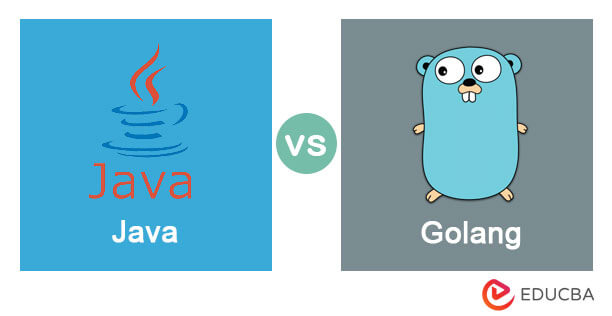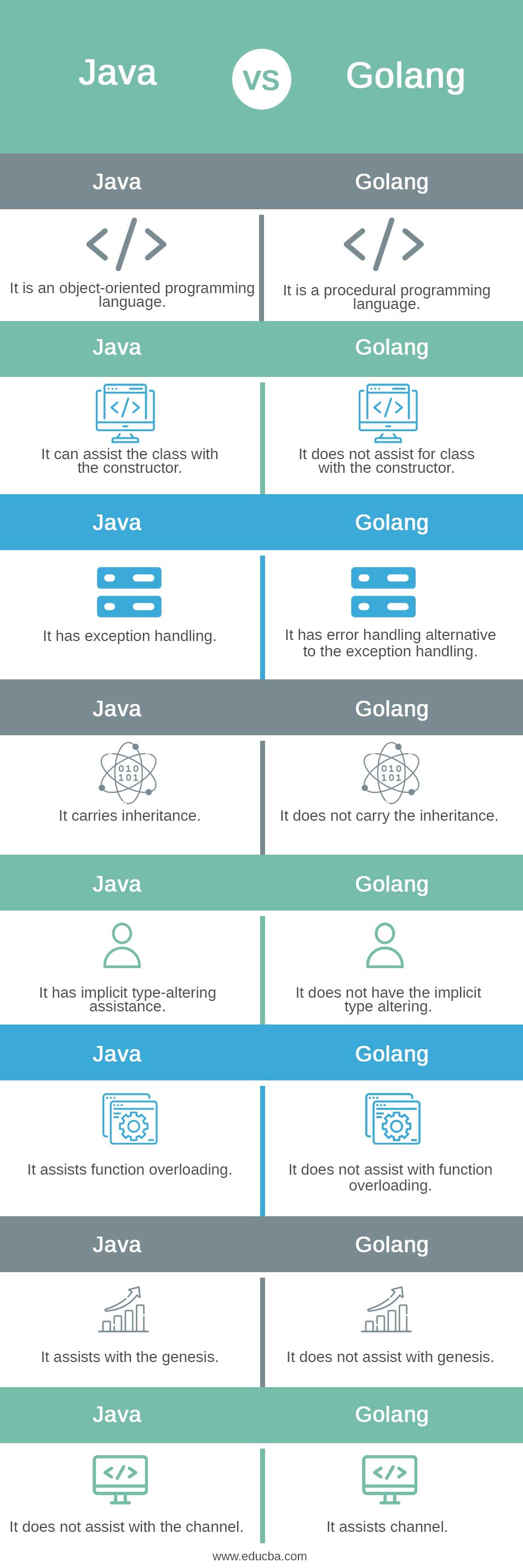Updated July 1, 2023

Difference Between Java vs Golang
The following article provides an outline for Java vs Golang. Java and Golang are dynamic, famous, functional languages but have vast differences. When we try to concern Go vs. Java with microservices, then Go is more sustainable. Suppose the service is more complicated using database tables and also with many API points. In that case, we trust that the performance is received from the Java syntax and that the separation of complication with libraries like JPA can be notable and sufficient to explain the educating curves. In the case of popularity, Java surpasses Go; Java is a more popular and extensively utilized server-side language. As we can see JJava is competing with Python, Go, and many more.
Java is the object-oriented, general-purpose computer programming language extensively utilized for evolving application game comfort, wireless telephone, and data centers. Java is totally more liked than Golang as numerous organizations mainly utilize it.
On the other hand, when we talk about Golang, as we know, Golang is an open-source computer programming language that Google and Golang launch does not carry its irrelevant quality like Java.
What is Java?
James Gosling developed Java at Sun Microsystems, launching it in 1995 as an object-oriented, concurrent, general-purpose computer programming language. Java finds common utilization in evolving Java applications for laptops, data centers, game consoles, scientific supercomputers, wireless phones, and more. It is a computing platform, and many organizations widely prefer it, recognizing Java as one of the most dependable, assured, and rapid computer programming languages.
What is Golang?
Golang is called Go, which is an open-source computer programming language that was launched in 2009. It is beginning to support away all the surplus things built in languages like C++. As a result, it does not carry irrelevant qualities like method and operator overloading, pointer arithmetic, and type inheritance. It approaches with some go procedures, powerful security, and excellent libraries. Go has some particular design necessities and how depression and spaces are utilized. It also needs that none of the defined variables or imported libraries are unused. All functions in Go need a return statement.
Head to Head Comparison Between Java vs Golang (Infographics)
Below are the top 8 differences between Java vs Golang:
Key Difference Between Java vs Golang
Let us discuss some of the major differences between Java vs Golang:
- Performance: Go runtime is slightly faster than Java in almost all tests. This has to do with the way it compiles. Go doesn’t rely on a virtual machine to run its code. It has been run directly into a binary file.
- Memory usage: Go is good at controlling memory at the place of links; it carries pointers. It has garbage collection, which usually moderates code execution. On the other hand, a JVM controls Java’s memory, and a more conventional garbage collector runs periodically. Both labor well for memory correction.
- Features: The Java community has been utilizing this language for an extensive time. They frequently ask to append various functions to the language, and more of them establish their reaction. Go is outlined as easy, Whereas Go is expected to have fewer qualities as a planned oddity.
- Cross-platform development: When it comes to cross-platform development, the choice is mainly Java. With the JVM, Java is a stairway forward as we have to compile the code using JVM to compile it on various platforms. While Go effort separately, it compiles binary files adversely for every platform. Java is a platform-independent language.
Java Requirement
- There are no general requirements, as there are various applications of Java for all types of platforms.
- It requires at least an 8-bit processor for Java run time.
- Nowadays, Java run time is also available in 32-bit and 64-bit.
- We need a Java runtime environment, a Java development kit, and JVM to run a Java program.
Golang Requirement
- It requires a tool to edit our code. Any editor can work great with it.
- The most famous text editor is VSCode, GoLand, and Vim.
- It also requires a command terminal that can operate well by utilizing any terminal on Linux, Mac, and PowerShell.
Comparison Table of Java vs Golang
Below are the top comparisons between Java vs Golang:
| Java | Golang |
| It is an object-oriented programming language. | It is a procedural programming language. |
| It can assist the class with the constructor. | It does not assist for class with the constructor. |
| It has exception handling. | It has an error-handling alternative to exception handling. |
| It carries inheritance. | It does not carry the inheritance. |
| It has implicit type-altering assistance. | It does not have the implicit type altering. |
| It assists function overloading. | It does not help with function overloading. |
| It helps with the genesis. | It does not help with genesis. |
| It does not help with the channel. | It assists the channel. |
Java vs Golang Programming Language Examples
Before we calculate the differences between these two languages, let’s look at the piece of code with similar examples.
Calculation of all integers from 1 to 10 in Java:
Code:
package calcint;
public class newint {
public static void main(String[] args) {
int intval;
int last_val = 11;
for (intval = 0; intval < last_val; intval++) {
System.out.println("Loop Value = " + intval);
}
}
}Now, let us take a look at the same example in Golang:
Code:
import "fmt"
func calcint() {
for i := 1; i <= 10; i++ {
fmt.Println(i)
}Yup, that’s it. Not so hard, is it? When I ran these two, I got results pretty amazing. I ran Java in the JVM and Go in its basic interpreter, and to my shock, Go was faster than Java. Maybe GO is faster than Java in small pieces of code, so I dug in a bit deeper.
Memory Usage in GO vs Java
Memory cleanup in Go is somewhat similar to that of Java here. It has automatic garbage collection. Thus, the hassle of explicitly freeing up memory or deletion certain apps was indeed escaped. The Go developers intended to pry open the efficiency of garbage collection. Besides these, they made GO so that it now utilizes the simple mark and sweep garbage collection method, thus making it more efficient.
There is even no function overloading supported in GO. Thus, this saves go from language fragility and doesn’t cause a mess when sweeping up the memory like it does in an ugly way in Java.
Purpose of Java
Initially, the developers created the Java programming language to build software for a wide range of network devices and embedded systems. The main purpose was to build a compact, definitive, movable, dispersed, real-time operating platform. Java is a general-purpose language as it requires JVM to run the code, but we can say that Java is absolute for new coders because it is simple to use. It takes care of much of the beyond-clip action.
Purpose of Golang
Corrected: Golang, an open-source programming language commonly known as Go, is utilized for general purposes. Google engineers have developed it to generate reliable and structured software. It was designed to address heated critiques over the other programming languages that Google had utilized. Its main purpose is to construct dispersed network services applications, cloud-native development, media platform, and news outlets.
Conclusion
This article concludes that Golang is better than Java because Java’s virtual machine adds complexity to code compilation. Also, it authorizes Java to run on any platform, whereas Golang does not require a virtual machine, so this article will help to understand the difference between Java and Golang.
Recommended Articles
We hope that this EDUCBA information on “Java vs Golang” was beneficial to you. You can view EDUCBA’s recommended articles for more information.

